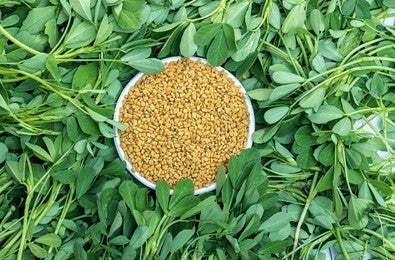What is Fenugreek Herb?
Fenugreek is a beautiful herb that is used both medicinally and as a spice in a variety of cuisines. It is frequently referred to as "Methi" in India. This herb is referred to by its Latin name, Trigonella foenum graecum.. Not only are the seeds of this herb employed, but the leaves are also effective in a variety of health conditions. This herb is widely distributed in South and Central Asia.
General Description
The fenugreek herb is an annual plant with three tiny obovate to oblong leaflets. These green leaves are 30-60cm tall and have thin beaked pods that are 10-15cm long. These leaves' pods carry 10 to 20 tiny brown seeds.
Other names
English name: Fenugreek
Hindi name: Methi Dana
Kannada name: Menthya
Marathi name: Methya
Telugu name: Menthulu
Tamil name: Vendayam
Classification
Kingdom: Plantae
Subkingdom: Tracheobionta
Superdivision: Spermatophyta
Division: Magnoliophyta
Class: Magnoliopsida
Subclass: Rosidae
Order: Fabales
Family: Fabaceae
Genus: Trigonella
Species: Trigonella foenum-graecum
Ayurveda Medicinal Properties
|
Particular |
Hindi / Sanskrit |
English |
|
Rasa (Taste) |
Katu, Tikta |
Pungent, Bitter |
|
Guna (Qualities) |
Laghu, Snigdha |
Light, Unctuous |
|
Virya (Potency) |
Ushna |
Hot |
|
Vipaka (Post-Digestive Taste) |
Katu |
Pungent |
Effects on Tridosha
It balances Kapha and Vata dosha.
Chemical Composition
Fenugreek is a type of herb that's packed with lots of nutrients. It's made up of tetosides, diosgenin, gitogenin, tigogenin, trigonelloside, yomogenin, graceunin A, B, C, H, I, J, K, L, M, trigofoenosides, gitogenin, choline, trigonelline, yamogenin, neotigogens, and tigogenin,and other elements. It's also packed with thiamin, riboflavin, folic acid, niacin, riboflavin, B6, vitamins A, C, and K, copper, magnesium, calcium, selenium, zinc, manganese, and potassium, among other nutrients.
Benefits of Fenugreek Herb
Fenugreek has several health benefits, which are listed below:
- Deepani: This herb strengthens the digestive fire.
- Vatahara: It balances vata dosha ailments such as paralysis, constipation, neuralgia, bloating, and so on.
- Kaphahara: It balances kapha problems such as asthma, bronchitis, chest congestion, and coughing, among others.
- Prameha: This herb is really beneficial in type 2 diabetes and urinary tract diseases.
- Aruchi: Beneficial in anorexia.
Benefits
Fenugreek herb is beneficial for diabetes
This herb contains amino acids, which have anti-diabetic potential. This characteristic lowers elevated blood glucose levels. Fenugreek seeds contain fiber, which slows digestion and aids in the absorption of sugar and carbs by the body. Diabetics should take five grams of fenugreek powder twice a day with plain water. This herb's seeds can also be used. In a glass of water, soak one teaspoon of fenugreek seeds. On an empty stomach, sip this water first thing in the morning.
Fenugreek Herb is Beneficial for Breast-Feeding Mothers
It is a highly healthy plant for nursing women. This herb contains galactagogue, which promotes breast milk production. The most nutrient-dense food for a newborn baby is breast milk. On an empty stomach, a lactating woman can eat one teaspoon of fenugreek seeds or sprouts every day. Fenugreek tea is very healthy. Boil one teaspoon of fenugreek seeds in two cups of water until it is reduced to one cup. Drink the liquid once daily after straining.
Gastritis and bloating are treated with this Herb
This herb is helpful for bloating and gastritis because it balances the vata dosha in the body with the help of Vata imbalance Ayurveda. The seeds of fenugreek are also helpful for constipation. On an empty stomach, you can sip a glass of water infused with fenugreek seeds. Even these patients are able to cook using the herb's powder.
Fenugreek Herb is Beneficial in Inflammatory Skin Conditions
This herb's anti-inflammatory and antioxidant qualities help to lessen skin inflammation. It provides efficient outcomes for the itching issue. The herb fenugreek also purifies blood. You can make a paste of dried leaves or seeds and apply it to the irritated and swollen skin. Apply it to the skin's afflicted region. Fenugreek herb relieves pain, and inflammation, and lessens boils, abscesses, and wound swelling.
Fenugreek Herb is used in Obesity
Fenugreek herb consumption boosts the metabolism rate in obese persons, which aids in the reduction of extra body fat. Therefore, using this herb regularly has great benefits.
This Herb is helpful in increasing libido
The fenugreek herb aids in increasing libido and testosterone levels. Because it improves strength and endurance, incorporate this herb into your everyday regimen.
Fenugreek Herb is Beneficial for Hair Growth and Dandruff
Fenugreek herb sprouting seeds should be made into a paste. Use this paste on your hair to treat the issues of split ends, thin hair, and dandruff. Consume one capsule of fenugreek every day for quicker hair growth.
Medicinal Purposes
The entire plant, including the seeds and leaves, is utilized for medical purposes.
Indications
The herb fenugreek is used to treat the following issues:
- Diabetes
- Constipation
- Paralysis
- Neuralgia
- Skin diseases
- Hair problems
- High Cholesterol levels
- Obesity
- Anorexia
- Leucorrhoea
- Wounds
- Abscess
- Boils
- Abdominal colic pain
- Asthma
- Cough
- Chest congestion
- Bronchitis
- Lactating mother
- Fever
Dosage
Here is a detailed description of the dosage for this herb:
- Take one to two capsules, once or twice daily, after meals, with a glass of water.
- Make sure that the 500 mg standardized extract of fenugreek herb is used to produce fenugreek capsules.
- Take three to six grams of fenugreek powder, dissolved in water, once or twice daily, preferably right after meals.
Side-Effects
The following are a few instances where fenugreek herb adverse effects occur:
- Patients with heavy menstrual periods and nasal hemorrhage should avoid this herb.
- Avoid ingesting too much fenugreek herb because it is unsafe while pregnant. A pregnant woman may take it in very modest doses.
- When used improperly, this plant can have laxative effects and should not be used by anyone who has diarrhea.

